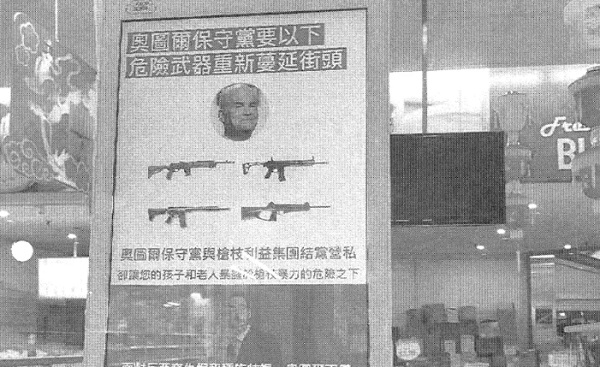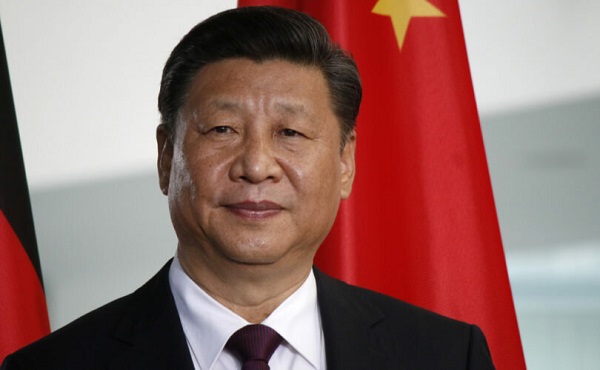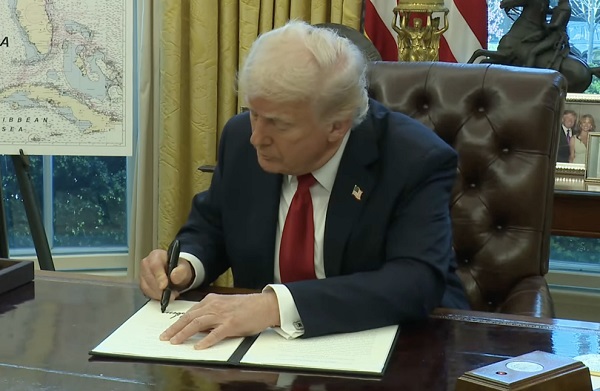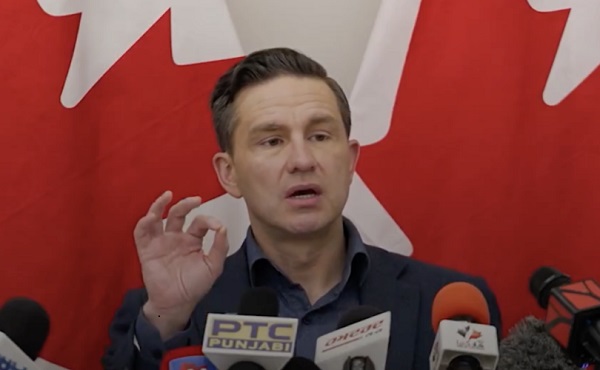Federal Election 2021
2021 Election Issues: Cost of Living

-
The Liberal government must immediately stop borrowing and printing money.
-
All levels of government need to implement drastic spending cuts to reduce the size and scope of operations. Free markets deliver goods and services more efficiently than government.
-
End the use of fiat money (government-issued currency not backed by a commodity) and instead move to a system of representative money, potentially backed by oil.
espionage
Democracy Watch Calls Hogue Foreign Interference Report “Mostly a Coverup”

A Hogue Commission document shows a 2021 election digital ad attacking then-Conservative leader Erin O’Toole in a Toronto-area grocery store that is linked to a pro-Beijing businessman.
Sam Cooper
Hogue Report Fuels Diaspora Fears Over Ottawa’s Foreign Interference Weakness
Friends of Hong Kong, a non-partisan diaspora group that withdrew from Ottawa’s Foreign Interference Commission a year ago over concerns it would whitewash Chinese interference and endanger diaspora groups, has issued a blistering rebuke of Commissioner Marie-Josée Hogue’s final report.
The group argues the 16-month inquiry fails to show the federal government can counter foreign interference.
In a statement detailing their misgivings, the human rights group says the final report “only serves to deepen our serious reservations regarding our government’s willingness and ability to tackle foreign interference.”
The group criticizes Commissioner Hogue for what they deem to be a pattern of “wilful blindness” in assessing the significance of alleged meddling in Canada’s democratic processes. They also take issue with Hogue’s characterization of foreign interference as “isolated cases,” emphasizing that “even one such case is too many for a democracy like ours.”
In February 2024, group leader Ivy Li explained its public statement and decision not to participate, citing concerns about the Commission’s “objectivity and security integrity.” She said these worries partly stemmed from the perception of Commissioner Hogue’s prior professional links to legal networks affiliated with various former Liberal prime ministers, and from a fear that the inquiry would not deeply probe China’s sophisticated, decades-long influence networks in Canada.
“Judge Hogue and her counsel are lacking expertise in how the Chinese Communist Party thinks and operates,” Li said, “[so] they will easily be manipulated in the whole process by Chinese Communist Party proxies.”
Li also pointed to Hogue’s past work at a Quebec law firm with ties to Pierre Trudeau and Jean Chrétien—two prime ministers known for deep political and business connections to the Chinese Communist regime and Liberal-linked industrialists—as a source of concern for Canadian Friends of Hong Kong.
Among the group’s critiques in a statement issued yesterday is a charge that Hogue “downplayed” the threats posed by transnational repression.
“Justice Hogue adds another blow to the confidence of the diaspora communities,” the group’s statement reads, noting many community members live “under constant fear and threats.”
The organization also disputes the commissioner’s assessment that parliamentarians with “problematic relationships” or “questionable ethics” merely acted naively. “It demonstrates a lack of understanding of the extent and threat that such parliamentarians pose to Canadian democracy,” the group warns, expressing fear that Hogue’s approach “will only condone more of such conduct.”
The Bureau is a reader-supported publication. To receive new posts and support my work, consider becoming a free or paid subscriber.
In addition, Canadian Friends of Hong Kong calls for immediate legislation to implement a Foreign Influence Transparency Registry. They urge that the registry’s scope extend beyond the Lobbying Act to include all political parties, all levels of government, and any appointed public office holders. They also call for granting the commissioner and registry full independence from the Prime Minister and Cabinet.
A second diaspora group, representing Uyghur Canadians, similarly withdrew from the Commission in January 2024. Both organizations cited concerns that senior officials with potential ties to the Chinese government were given high-level access during the proceedings. In a post to X yesterday, Uyghur Canadian group leader Mehmet Tohti wrote: “Downplaying the impact of hostile interference, infiltration, and influence in Canada by the [Commission] not only undermines the gravity of the threat but also sends a dangerous message—whether intentionally or not—that such activities can continue unchecked. … The Commissioner and the commission must recognize that this is not just a policy issue; for many of us, it is a matter of life and death.”
Meanwhile, Duff Conacher, a longtime transparency advocate with Democracy Watch, also took aim at Hogue’s final report, calling it “mostly a cover-up of foreign interference, because it ignores a dozen loopholes in federal laws that allow for secret, undemocratic and unethical spending, fundraising, donations, loans, lobbying and disinformation campaigns by foreign proxies.”
Democracy Watch stated the report “fails to recommend crucial reforms to Canada’s enforcement bodies, which remain politically dependent, slow to act, ineffective, secretive, and unaccountable.” The group added, “Any party that triggers an election before these changes are enacted should be shunned by voters for enabling foreign interference.”
The Bureau is a reader-supported publication. To receive new posts and support my work, consider becoming a free or paid subscriber.
espionage
China bragged it meddled in 41 candidates’ campaigns in Canada’s 2019 election: report

From LifeSiteNews
Toronto area ridings, including one in the city of Markham which saw Trudeau personally campaign in, are now under investigation by the ongoing Commission on Foreign Interference.
The Chinese Communist Party (CCP) boasted it successfully managed to get no less than eight of some 41 preferred candidates elected in Canada’s 2019 federal election, an investigative reporter’s findings have revealed.
Investigative journalist Sam Cooper, who works for The Bureau, recently made known that he was able to obtain an analysis published in February 2021 by a CCP-run group called All-China Federation of Returned Overseas Chinese (ACFROC), which included the shocking revelations.
The 2019 federal election saw Prime Minister Justin Trudeau’s Liberal government re-elected to a second term. In that election, there were no less than 41 “distinguished Chinese candidates” who were officially endorsed by the People’s Republic of China (PRC), in Toronto-area ridings that saw Trudeau personally campaign.
According to the ACFROC report, which is the main agency of the CCP’s United Front, a political group that connects mainland China to Chinese in other nations, “Trudeau Jr. personally went to seek votes at a Chinese supermarket in Markham, an area of Toronto where Chinese people live, demonstrating that Chinese votes play an important role in the general election.”
As it stands now, the Toronto area ridings, including one in the city of Markham which saw Trudeau personally campaign in, are now under investigation by the ongoing Commission on Foreign Interference. A report from the National Security and Intelligence Committee of Parliamentarians (NSICOP) has shown that there are no less than 11 candidates known to have been directly influenced by China.
The main goal of the ACFROC is to “mobilize diaspora networks” that are in line with the will of the CCP, as noted by Alex Joske, author of the 2022 book Spies and Lies.
The report said that popular Chinese app WeChat was used to mobilize voters, going all the way back to the 2015 and 2011 elections.
According to Charles Burton, an expert in the Chinese language who looked at the ACFROC report for The Bureau, the use of the term “distinguished” to refer to the Chinese candidates who were nominated “implies identification of candidates potentially useful to the United Front’s aims.”
“This article clearly aims to guide the agents of the Chinese Communist Party’s United Front Work Department in their strategic work to gain leverage for China by placing persons of Chinese origin into the Parliament of Canada,” noted Burton.
LifeSiteNews recently reported that Cooper unveiled how four politicians along with one government advisor were named as allegedly being involved in a scheme backed by the CCP to purposely interfere in Canada’s electoral process.
The Foreign Interference Commission was convened to “examine and assess the interference by China, Russia, and other foreign states or non-state actors, including any potential impacts, to confirm the integrity of, and any impacts on, the 43rd and 44th general elections (2019 and 2021 elections) at the national and electoral district levels.”
The commission is headed by Justice Marie-Josée Hogue, who had earlier said she and her lawyers will remain “impartial” and will not be influenced by politics. In January, Hogue said that she would “uncover the truth whatever it may be.”
As reported by LifeSiteNews, documents from a federal inquiry looking at meddling in Canada’s past two elections by foreign state actors show that agents of the CCP allegedly worked at Elections Canada polling centers during the 2021 campaign.
To date, Trudeau has been coy and has never explicitly stated whether he was ever told by the Canadian Security Intelligence Service (CSIS) that CCP agents’ actions were in breach of the nation’s Elections Act.
A few months ago, the head of Canada’s intelligence agency testified under oath that he gave Trudeau multiple warnings that agents of the CCP were going after Conservative MPs, yet the prime minister has denied receiving these warnings.
-

 Alberta1 day ago
Alberta1 day agoAlberta Institute urging Premier Smith to follow Saskatchewan and drop Industrial Carbon Tax
-

 Addictions1 day ago
Addictions1 day agoShould fentanyl dealers face manslaughter charges for fatal overdoses?
-

 2025 Federal Election2 days ago
2025 Federal Election2 days agoFool Me Once: The Cost of Carney–Trudeau Tax Games
-

 Alberta1 day ago
Alberta1 day agoAlbertans have contributed $53.6 billion to the retirement of Canadians in other provinces
-

 2025 Federal Election1 day ago
2025 Federal Election1 day agoChinese Gangs Dominate Canada: Why Will Voters Give Liberals Another Term?
-

 Automotive2 days ago
Automotive2 days agoTrump announces 25% tariff on foreign automobiles as reciprocal tariffs loom
-

 Energy1 day ago
Energy1 day agoEnergy, climate, and economics — A smarter path for Canada
-

 Also Interesting21 hours ago
Also Interesting21 hours agoThe bizarre story of Taro Tsujimoto







